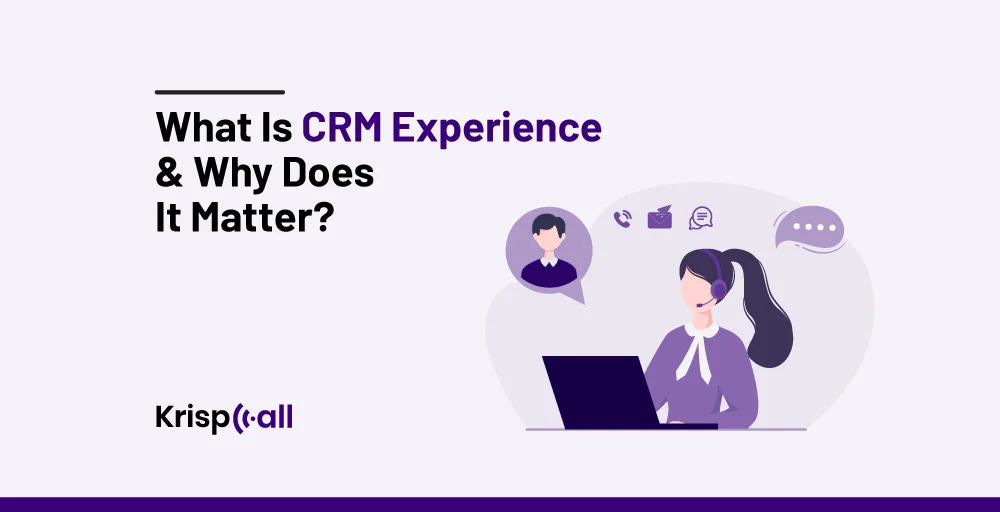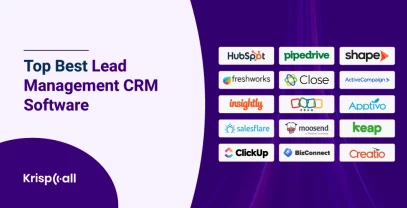Did you know that 74% of CRM companies have said they have better customer relationships? 🤔 CRM is a top-rated tool among businesses wanting to provide better customer service, and around 12% of the CRM market grows yearly. CRM is a technology that manages all your company’s interactions with current and potential customers
CRM software can provide businesses with maximum benefits, but to use it properly, one must have proper CRM experience. With CRM experience, businesses can effectively understand and manage all aspects of customer relationships. They can use data insights to anticipate customer needs, provide personalized service, and foster long-term relationships.
Want to know more about CRM experience? 📜 Then, keep reading this blog.
This blog will explain everything about the CRM experience, including how it improves customer experience and how to implement it in your business.
🔑 KEY HIGHLIGHTS
- Customer Service Experience is how businesses optimize their CRM to ensure the best possible customer experience.
- Experience in CRM helps you understand customers and manage all aspects of customer interaction effectively.
- CRM software centralizes all the data, provides in-depth knowledge of customers, helps you tailor conversations, and manages all the social media requests to improve your customer experience.
- To implement CRM experience in your business, you first need to understand the requirements of your business across all the departments.
What is CRM experience?

The Customer Relationship Management (CRM) experience is how a business uses a CRM system to interact with customers throughout their journey and provide them with the best possible experience.
It reflects a company’s expertise in using CRM software to effectively understand and manage every aspect of customer relationships. It involves using data insights to anticipate needs, deliver personalized service, and cultivate long-term relationships. In short, the CRM experience is about creating significant connections that keep your customers returning for more.
Instead of viewing customers purely as a means to financial gain or fame, businesses with CRM expertise prioritize empathy, responsiveness, and proactive communication. A strong CRM capability empowers businesses to stand out, build customer loyalty, and drive revenue growth.
The company can only increase its revenue with a more secure customer base. And only a positive customer service experience can obtain a loyal customer who buys from the company. A good CRM experience can boost 📈 revenue in various ways, such as;
- By providing better leads,
- Increasing customer satisfaction,
- Increasing customer retention,
- Improving cross-selling and upselling opportunities.
Providing better leads, increasing customer satisfaction and retention, and improving cross-selling and upselling opportunities can automatically boost the company’s revenue.
Why does CRM experience matter?
In today’s fast-paced world 🌐, customers expect more than businesses’ products or services. They expect personalized conversation, proper experience, and many other things. So, CRM experience plays an important role in keeping up with all their expectations.
It provides various benefits and opportunities for business and their employees. With excellent CRM experience, companies can unlock multiple growth opportunities.
- Enhance customer service: CRM experience will help a business enhance its relationship with the customer. As CRM stores more detailed information about customers within the company, agents can get this information and provide the best customer service.
- Increase sales: CRM experience allows businesses to gain key customer insights, which allows them to make data-driven decisions that drive sales. Moreover, it empowers companies to manage business sales leads, organize the sales process, and automate various tasks in one centralized platform.
- Better marketing: CRM experience helps businesses understand customer behavior, provide a targeted marketing campaign, and track performance through CRM software. Internal departments can also collaborate to access information faster.
- Improve customer satisfaction and retention: CRM experience helps businesses better understand their customers, provide personalized experiences, solve problems quickly, and constantly improve how they serve customers. These efforts all work together to make customers happier and build strong, lasting relationships.
How does CRM software improve customer experience?
CRM software gathers all the essential customer data, such as the customer’s interests, preferences, purchase history, and many more. After gathering all this information, a business can tailor products or target customers according to your business idea 💡and provide a better service to client needs.
There are many other ways CRM software can improve customer experience; let’s take a look at them;
1. Centralized all the customer data
One of CRM’s major features is its ability to centralize all information in one single dashboard. It keeps all the important information about customers or future prospects regarding their contact, purchase history, email, and social media.
When all this information is stored in one place, it will be easier for sales reps to access it whenever they need to. Plus, they can instantly provide service to customers, which further enhances the positive experience for both customers and the business.
2. Send personalized communication
CRM system allows businesses to send customized emails, calls, and texts to customers. For example, the data you’ve gathered with the help of a CRM system helps you study more about your customers. After learning and understanding the customer’s needs, companies can tailor emails 📧 and send them personally.
62% of customers will click open in an email if the business sends them a customized subject line. Personalized communication will help companies build better relationships with their customers and add cheerful experiences to their business.
3. Keep customer experience consistent
CRM software helps businesses ensure that customers receive the same level of service and communication across all channels. When customers get consistent messages and support, they feel valued and important to the company.
Furthermore, CRM systems allow businesses to quickly respond to customer questions, send automatic emails, and ensure that all employees have the same information. This consistency improves how customers see the brand, makes them more likely to stay loyal, and increases their overall satisfaction.
4. Provide in-depth knowledge of customer
Your CRM system stores detailed information about customers, including their product interests, purchases, and preferences gathered from website visits and social media interactions. This data helps you learn more about what customers want and what products they might be interested in. With this knowledge, you can tailor the product and recommend items that align with each customer’s preferences.
Similarly, your CRM will provide a summary of sales reports and customer activity that can measure main metrics and KPIs. These metrics reveal customer behaviors, popular products, and team members’ performance.
5. Manage requests on social media
Social media has become the central hub for companies to grow their business. Over 65% of consumers use social media, making it a great platform to collect data and engage with the business and customers. With the help of CRM software, companies can collect all the service requests and company mentions from all their social media accounts and send them to a centralized database. This way, you can provide service immediately and never miss any inquiries and issues.
Businesses can also integrate CRM software with various social media sites and provide excellent service without worrying about switching from one platform to another.
6. Providing service based on customer profile
When CRM collects customer data, it categorizes the information based on various factors, such as locations, interests, age, purchase pattern, journey, etc.
Dividing and categorizing customers according to their profiles will help businesses easily provide them with services. Moreover, businesses won’t have to look out for customers as new patterns and trends emerge. They can simply look into a customer’s profile according to their division and send them more personalized messages.
7. Create a customer-centric process
A customer-centric method prioritizes the customer experience at every step of the customer journey. Most businesses prioritize their customers and always focus on how they can provide the best service in the most convenient way. When a company uses data from CRM, it can focus on giving the best possible experience to the customer.
An effective CRM experience will help the business create a customer-related process across the company. Businesses can build customer loyalty and advocacy using CRM, leading to repeat sales, higher retention rates, and more significant revenue.
How does CRM experience help your business?
CRM experience helps your business increase sales and improve communication with customers. Moreover, it can help employees stay more organized and communicate better to identify sales more easily and quickly.
Let’s take a look at how exactly CRM experience helps businesses;
1. Lead management
Identifying and managing leads is an important aspect of any business. With CRM experience, businesses can track leads throughout the buyer’s journey and purchasing history. Almost 74% of companies have improved their access to customer data with CRM.
With lead management, businesses can take notes on every interaction and store that interaction on the customer’s profile. Sales reps can also easily access all that information any time they want. This helps business review a lead’s journey without having to search for new information,
2. Workflow automation
Workflow automation will help your employees focus on more important tasks through marketing automation. For example, when a new prospect requests email-gated information (like an ebook or industry report), the CRM can trigger an automated email with relevant marketing materials to be sent.
It also creates a profile for the new customer in the CRM system, saving sales representatives from doing repetitive work. Additionally, workflow automation can segment new leads automatically based on their interests and interactions, further streamlining the process and maximizing efficiency.
3. Analytics
CRM systems are powerful tools that help businesses understand their customers better. It collects important details like age, gender, where they live, what they do for work, and what they’re interested in.
Knowing these details helps businesses create personalized marketing strategies. Instead of sending the same message to everyone, they can tailor their approach to fit each group’s interests and needs. This makes marketing more effective because it speaks directly to what each customer cares about.
How do you implement CRM experience in your business?
To implement CRM experience in your business, you first need to understand the requirements of your business across all the departments. Here are some factors to implement CRM experience in your business;
- Identify customer touchpoints: Measure the customer journey and try to identify where you and customer interaction has occurred more.
- Invest in the best CRM software: Identify your business goals and ideas and choose the best CRM. Also, look out for its integration features with your existing system.
- Train your team: Ensure that your team receives the best training to provide customer service using CRM software.
- Prioritize personalization: As we know, customers love personalized messages, so try to create more personalized interaction and communication with the customer.
Conclusion
CRM experience is one fundamental aspect of modern business. It prioritizes customer relationships and delivers exceptional experiences; companies can grow more loyal customers and increase revenue. CRM experience matters the most as it increases business sales, helps business satisfy their customer, enhances customer service, and many more. With the right strategies and tools, companies can improve overall customer experience.
CRM not only enhances customer experience but also aids businesses in managing their leads effectively. With CRM expertise, businesses can track leads throughout their buying journey and understand their purchasing history. Moreover, CRM allows sales agents to prioritize important tasks while automating repetitive work through workflow automation.
FAQs
What is the salary of a CRM experience manager?
According to Glassdoor, the average salary for a CRM experience manager is $81,833 per year, and the estimated total pay is $113,595 per year.
What are CRM skills?
CRM skills are communication, collaboration, technical skills, project management, CRM software, interpersonal communication, database management, analytic reasoning, and many more.
How to get CRM experience?
To get CRM experience, you need to follow these steps;
- You need to study resources on customer relationship management.
- Take a course or training program and earn experience and certificates.
- Join CRM Communities.
- Volunteer.
What CRM experience skills do you need on your resume?
Some CRM experience skills you must have on your resume include communication, collaboration, leadership, technical skills, project management, and analytics.





